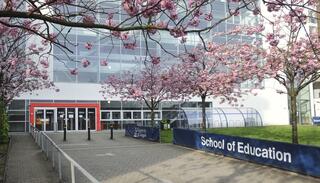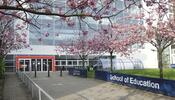Seminar Series:

In association with the School of Education Quantitative Methods Special Interest Group, CR&DALL is hosting a joint presentation by Dr Radomir Ray Mitic, William & Mary College, USA and Dr Leping Mou, University of Glasgow on their joint work on he impact of liberal arts education on civic and democratic citizenship. See below for more details.
Speakers: Dr Radomir Ray Mitic, William & Mary College, USA and Dr Leping Mou, University of Glasgow
Date: Wednesday, 25th June 2025, 11:00-12:00pm
Location: Room 234, St Andrews Building, 11 Eldon St, Glasgow G3 6NH
Abstract
Current social challenges, including a loss of social cohesion, rising nationalism, and racism, highlight the importance of cultivating civic and democratic citizenship through education. Higher education institutions, such as universities and colleges, contribute significantly to this goal by enhancing individual knowledge, skills, and research capacities, which in turn bolster economic productivity, social mobility, civic engagement, health improvements, cultural enrichment, and global cooperation. Given the decline in public trust in higher education, it is crucial to provide empirical evidence of its impact in cultivating active, engaged citizens to counteract these trends.
Liberal arts education, often regarded as the typical feature of American higher education, has long been praised for its role in cultivating students' overall development as actively engaged citizens, in addition to providing professional training. However, there has been a lack of empirical evidence from longitudinal data, particularly regarding which specific elements or factors are most effective.
This convergent mixed methods study utilizes the College and Beyond II dataset of 2,751 public college and university alumni from seven institutions in the United States to examine the association between liberal arts education elements (multidisciplinary curriculum, active pedagogy, extracurricular activities, mentorship, and residential learning) and the development of qualities of engaged citizens (openness to diversity and challenge, pluralistic orientation, generative behaviour, civic and democratic behaviour). This study utilizes inverse propensity to treatment weighting (IPTW) to control for selection bias and qualitative thematic analysis to corroborate quantitative findings. This evidence will have important local and global implications for higher education as state and regional institutions in the US and other contexts.
The presentation is based on an ongoing research project using secondary data collaborated by Dr Radomir Ray Mitic (William & Mary) and Dr Leping Mou (Glasgow). The study is funded by Arthur Vining Davis Foundation/American Council of Learned Societies’ Fellowships for Research on the Liberal Arts. Currently, Dr. Mitic is a visiting academic at Glasgow for two weeks (June 16-28).
About the speakers
|
|
Dr. Radomir Ray Mitic (he/him/his) is an Assistant Professor of Higher Education at William & Mary where he teaches in the master's and doctoral programs. Dr. Mitic's program of research centres on the equitable outcomes of higher education at the local, national, and international levels. His recent work on outcomes includes post-college civic engagement and graduate aspirations, enrolment, and attainment.
|
|
|
Dr. Leping Mou is a Lecturer / Assistant Professor in Higher Education and Comparative International Education at the University of Glasgow. His research primarily revolves around the intricate ways in which universities and colleges fosters students' capabilities development for both career advancement and overall personal growth within diverse societal contexts. His recent research focuses on liberal arts education, outcomes of higher education, and higher education in diverse contexts and traditions.
|
Gallery images (click to enlarge):
- Log in to post comments















Latest Comments